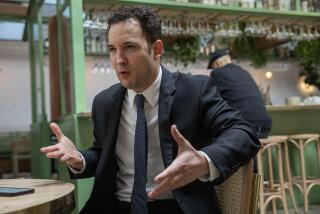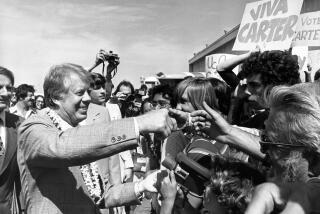Once Rejecting Politics, Gore May Test Power of No. 2 Job : Influence: Passion to shape policy led to Washington. But his ability to do that now depends on Bill Clinton.
WASHINGTON — Al Gore, the next vice president of the United States, once found public service so repugnant that he turned from it with a vengeance.
Disillusioned by Vietnam, Watergate and his father’s defeat in a nasty Senate reelection campaign, Gore became a government watchdog instead: He worked as a newspaper reporter.
During Gore’s six-year career at the Nashville Tennessean, his childhood passion for politics was rekindled as he discovered that, even as a journalist, he could influence public policy. Yearning for more power, he plunged headlong into a successful campaign for Congress.
That driving ambition could make Gore, a member of Congress since 1977, among the most powerful vice presidents in history--if President-elect Bill Clinton delivers on his campaign promises to make Gore a key player on arms control, the environment, science, technology and as a congressional liaison.
Gore is well aware that most presidential candidates have made similar promises--only to renege after taking office. He harbors no undue expectations, despite the remarkable mutual affinity he and Clinton developed during the campaign.
Although the two have much in common, they disagree on some key issues: a presidential line-item veto, which Clinton favors but Gore opposes; some environmental protection policies and the question of whether states like Oregon should be granted a freer hand in containing health care costs.
During the campaign, Gore significantly toned down his environmental rhetoric and abandoned many specific proposals he advanced in his best-selling book, “Earth in the Balance.” Those proposals include stringent new fuel efficiency standards for American automobiles and a carbon tax, which would be imposed on those who use petroleum-based carbon products such as oil and coal and would be offset by reductions in income or payroll taxes.
And Clinton has all but confessed that as Arkansas governor, he has made a “false choice” by favoring job protection over environmental protection.
Both he and Gore now emphasize that protecting and cleaning up the environment can create new jobs on a large scale. But the strength of Clinton’s commitment to environmentalism remains to be tested.
He and Gore also disagree on whether the federal government should allow Oregon to reduce the number of services to its Medicaid population as a way to cut costs while at the same time expanding eligibility. Clinton favors the experiment; Gore opposes it.
How Clinton and Gore resolve such differences will go a long way toward defining a Gore vice presidency--and a Clinton Administration.
“We have a relationship of mutual respect and trust,” Gore said. “We’ve talked things out together and we come up with ideas together. I will do everything I possibly can to give him the best advice . . . and to help him implement his decisions.”
Albert Arnold Gore Jr. was born on March 31, 1948, to then-Rep. Albert A. Gore Sr. (D-Tenn.), and Pauline Gore, a high-powered Washington lawyer. After Clinton picked Gore as his running mate in July, the senior Gore said of his namesake: “He was raised for it.”
The future vice president grew up in a residential hotel in Washington where politicians were fixtures. He attended private schools there but spent summers on the 255-acre family farm in Carthage, Tenn., where he now also owns a farm.
After earning a 1969 degree in government from Harvard, Gore entered the Army, serving as a journalist in Vietnam. He owes his start in journalism partly to his wife, Mary Elizabeth (Tipper) Aitcheson, whom he married shortly before shipping out to South Vietnam. They now have four children, ranging in ages from 10 to 19.
Tipper, a Tennessean news photographer, showed John Seigenthaler, then the paper’s editor, a vivid piece Gore had written about a South Vietnamese village shortly after a firefight.
“It wasn’t Ernie Pyle, but it was very good,” recalls Seigenthaler.
After Gore mustered out of the Army, he readily accepted a job offer from Seigenthaler. “I came to the conclusion that politics would absolutely be the last thing I did with my life,” Gore recalled.
As a cub reporter, he was assigned to monitor nighttime police activities. Even now Gore can proudly recite the numerical codes used by Nashville police. But he didn’t stay on that beat for long.
Gore’s next assignment was covering the Nashville Metro Council. There he discovered he could sometimes affect its debate and even actions merely by the degree of interest or ennui that he exhibited--sometimes subtly, sometimes with exaggeration.
“I began to see things that I thought needed to be done, and I began to think: If I got involved in that, I might help steer this in the right direction,” Gore recalled.
His proudest journalism achievement was a series of articles that exposed questionable ties between developers and elected officials, which led to the corruption conviction of an officeholder.
Even as an up-and-coming reporter, the intense, highly introspective Gore was searching for a deeper meaning in human existence. While working the police beat until 2:30 a.m., he attended Vanderbilt University’s divinity school by day.
“I went because the most important questions in my life have always been about who we are, what the meaning of life is,” Gore explained. “It turned out to be one of the most valuable years of my life.”
Later, fascinated by the criminal justice system as a result of his stories on government corruption, he enrolled in Vanderbilt’s law school. “I thought it’d be fun to cover the Supreme Court,” Gore said.
But in 1976, he abruptly abandoned that goal upon learning that the local congressman was retiring. By one account, Gore immediately dropped to the floor and began doing push-ups to get in shape for the campaign.
He won that race, serving in the House until 1984, when he won a Senate seat. In his 1990 reelection bid, Gore captured every county in Tennessee.
He is known as one of Capitol Hill’s smartest and hardest-working members, one whose media savvy has garnered considerable press coverage--and the resentment of some colleagues who regard him as a shameless self-promoter who too often goes with the prevailing winds.
When the House opened its floor debates to televised coverage in 1979, Gore delivered the first speech.
When he set out in 1980 to master the complexities of arms control, Gore spent eight hours a week for 13 months studying the issue.
And when “Earth in the Balance” came out earlier this year, he sent a copy to every contender for the Democratic presidential nomination.
It also is unclear just how well Gore will get along with his former congressional colleagues.
Gore displayed his independent streak in January, 1991, as the Senate neared a vote on whether to authorize President Bush to go to war to oust Iraq from Kuwait.
Despite Iraq’s invasion of Kuwait and the ensuing march toward military conflict, Gore had virtually ignored the Persian Gulf crisis, closeting himself in his parents’ Capitol Hill apartment to finish his book.
It wasn’t until the eve of the Senate vote that a sleep-deprived Gore finally focused on the issue--and strongly resisted the enormous pressure from his Democratic colleagues to vote against going to war.
In separate late-night visits to Senate Majority Leader George J. Mitchell of Maine and Minority Leader Bob Dole of Kansas, Gore asked each to grant him a late-morning speaking time during the next day’s nationally televised debate.
Dole later accused Gore of blatantly “shopping” his vote to get a prime speaking slot. But Gore strongly denied that charge, saying that at the time he truly had not yet made up his mind and thus wanted to sleep on it.
The next morning, Gore voted with the Republicans, enraging many of his Democratic colleagues. But he later earned his way back into good graces, in part by vehemently defending those who had voted against the popular war.
In addition to the environment, Gore has championed cable television regulation, stronger warning labels on cigarette packs, the creation of a national organ donor program and assorted new technologies, such as a nationwide high-speed computer network that will enable personal computer users, including students, to tap into massive data banks like the Library of Congress.
Gore briefly sought the Democratic presidential nomination in 1988, winning seven primaries in the South before finishing a dismal third in the New York primary. His speaking style was so wooden that some wags dubbed him “Al Bore.”
Even though he chose not to seek the nomination this year--citing the near-fatal accident to his son a few years ago--Gore didn’t hesitate when Clinton asked him to join the ticket.
“I didn’t hear the question in terms of personal ambition,” Gore said. “I saw it as an opportunity to give this country a better chance to change, and I thought I could make a material difference in the outcome of the election.
“When you really want something and don’t get it, but it comes back to you, it has a deeper meaning.”
More to Read
Get the L.A. Times Politics newsletter
Deeply reported insights into legislation, politics and policy from Sacramento, Washington and beyond. In your inbox three times per week.
You may occasionally receive promotional content from the Los Angeles Times.










